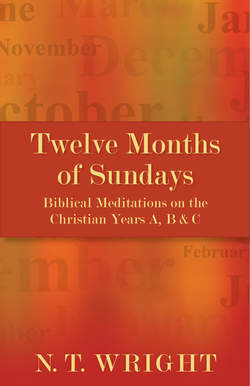Читать книгу Twelve Months of Sundays - N.T. Wright - Страница 12
На сайте Литреса книга снята с продажи.
ОглавлениеThe Fourth Sunday of Advent
Isaiah 7.10–16
Romans 1.1–7
Matthew 1.18–25
We were taught in college, and many repeat in the pulpit, that the word ’almah in Isaiah 7.14 doesn’t mean ‘virgin’, but ‘young woman’. It’s not that easy, actually: the word is rare, and the other uses, all compatible with virginity, don’t finally settle the issue. Nor does the more common word bethulah necessarily mean ‘virgin’. In Genesis 24.16 Rebekah is described as ‘a bethulah, neither had any man known her’. The Greek translation of Isaiah 7.14, which makes it unambiguously ‘virgin’, is not necessarily changing the original meaning, simply making things more explicit.
Why does all this matter (as it clearly does, considering how frequently the question is raised – indeed, one sometimes gets the impression that ’almah is the only Hebrew word some people know, and even that they get wrong)? Is it to suggest that Matthew (or his source) has invented the story of Mary’s virginal conception in order to cook up pseudo-‘events’ that just happen to ‘fit’ or ‘fulfil’ prophecy? Matthew is of course very concerned, not least in these early chapters, with all sorts of prophetic fulfilments; but if that were the origin of the story, how might we explain Luke’s account, where Isaiah 7 is not mentioned? Or the sneer about Jesus’ illegitimacy in John 8.41? It looks, rather, as though things worked the other way round: Matthew, faced with a deeply puzzling story about Jesus, found a biblical text that might shed some light upon it. Like Joseph, Matthew knew well enough what people would say. He was right: they still do.
In Isaiah, the fact of the ’almah being with child was given as a sign to the unbelieving king Ahaz, that un-David-like Davidic descendant, that God would rescue Judah from the northern threat, and would do so very soon, before the child reached an awareness of good and evil (when this moral maturing was supposed to take place is not clear). Eight centuries later Paul would write of another son of David through whom God’s rescue was assured, and the issue of good and evil settled: the one whose birth and resurrection now formed the summary of ‘the good news’, itself an Isaianic term.
Paul gives us the earliest written evidence that the phrase ‘son of God’ was acquiring, within developing Christianity, the meaning of ‘one who was from the beginning with the father’, without losing, as clearly in Romans 1 it has not lost, the meaning ‘Messiah’ which was one of its connotations in the Hebrew Scriptures. The ‘good news’ for which Paul has been ‘set apart’ is that God’s son has come to be of David’s seed, and has been publicly marked out as God’s son through the resurrection. Birth matters; resurrection matters more. Without Easter, nobody would ever have told the Christmas story. Ponder that when battling with seasonal mammon-worship, in which, as Marx wryly noted, purchasable commodities become the incarnation of the rival god. Mammon doesn’t raise the dead.
